
|
Astronomy Picture Of the Day (APOD)
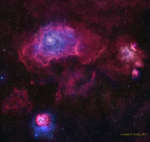 A Sagittarius Triplet
A Sagittarius Triplet
27.07.2017
These three bright nebulae are often featured on telescopic tours of the constellation Sagittarius and the crowded starfields of the central Milky Way. In fact, 18th century cosmic tourist Charles Messier cataloged two of them; M8, the large nebula above and left of center, and colorful M20 near the bottom of the frame.
 The Milky Way over Monument Valley
The Milky Way over Monument Valley
26.07.2017
You don't have to be at Monument Valley to see the Milky Way arc across the sky like this -- but it helps. Only at Monument Valley USA would you see a picturesque foreground that includes these iconic rock peaks called buttes.
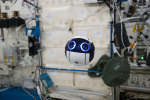 Int Ball Drone Activated on the Space Station
Int Ball Drone Activated on the Space Station
25.07.2017
What if you were followed around by a cute floating ball that kept taking your picture? Then you might be an astronaut on today's International Space Station (ISS). Designed by the Japan Aerospace...
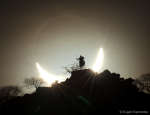 A Hybrid Solar Eclipse over Kenya
A Hybrid Solar Eclipse over Kenya
24.07.2017
Chasing solar eclipses can cause you to go to the most interesting places and meet the most interesting people. Almost. For example, chasing this eclipse brought this astrophotographer to Kenya in 2013. His contact...
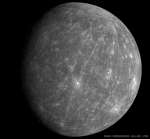 Mercury as Revealed by MESSENGER
Mercury as Revealed by MESSENGER
23.07.2017
Mercury had never been seen like this before. In 2008, the robotic MESSENGER spacecraft buzzed past Mercury for the second time and imaged terrain mapped previously only by comparatively crude radar. The featured image was recorded as MESSENGER looked back 90 minutes after passing, from an altitude of about 27,000 kilometers.
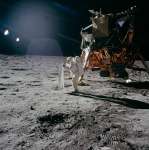 Apollo 11: Catching Some Sun
Apollo 11: Catching Some Sun
22.07.2017
Bright sunlight glints and long dark shadows mark this image of the lunar surface. It was taken July 20, 1969 by Apollo 11 astronaut Neil Armstrong, the first to walk on the Moon. Pictured...
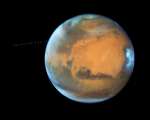 Phobos: Moon over Mars
Phobos: Moon over Mars
21.07.2017
A tiny moon with a scary name, Phobos emerges from behind the Red Planet in this timelapse sequence from the Earth-orbiting Hubble Space Telescope. Over 22 minutes the 13 separate exposures were captured near the 2016 closest approach of Mars to planet Earth. Martians have to look to the west to watch Phobos rise, though.
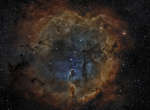 IC 1396: Emission Nebula in Cepheus
IC 1396: Emission Nebula in Cepheus
20.07.2017
Stunning emission nebula IC 1396 mixes glowing cosmic gas and dark dust clouds in the high and far off constellation of Cepheus. Energized by the bright central star seen here, this star forming region sprawls across hundreds of light-years, spanning over three degrees on the sky while nearly 3,000 light-years from planet Earth.
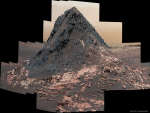 Ireson Hill on Mars
Ireson Hill on Mars
19.07.2017
What created this unusual hill on Mars? Its history has become a topic of research, but its shape and two-tone structure makes it one of the more unusual hills that the robotic Curiosity rover on Mars has rolled near. Dubbed Ireson Hill, the mound rises about 5 meters high and spans about 15 meters across.
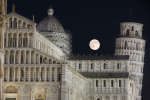 Thunder Moon over Pisa
Thunder Moon over Pisa
18.07.2017
What's wrong with this picture? If you figure it out, you may then realize where the image was taken. The oddity lies actually in one of the buildings -- it leans. The Leaning Tower of Pisa has been an iconic legend since shortly after its construction began in the year 1173.
|
January February March April May June July August September October November December |
|||||||||||||||||||||||||||||||||||||||||||||||||